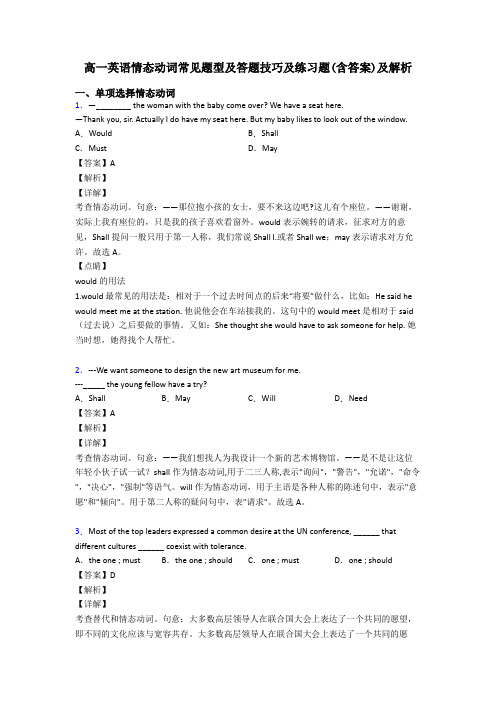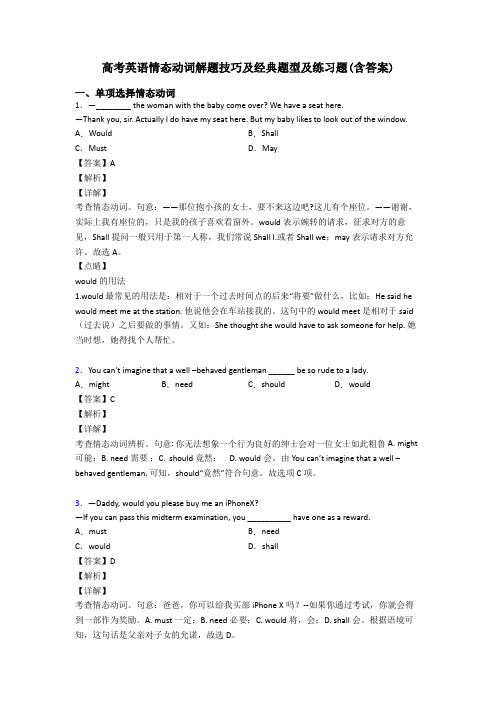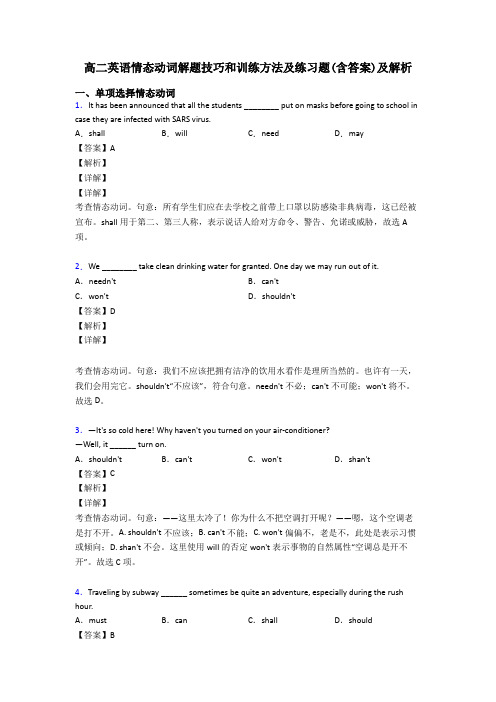高中英语情态动词解题技巧讲解及练习题(含答案)
- 格式:doc
- 大小:78.50 KB
- 文档页数:16

高一英语情态动词常见题型及答题技巧及练习题(含答案)及解析一、单项选择情态动词1.—________ the woman with the baby come over? We have a seat here.—Thank you, sir. Actually I do have my seat here. But my baby likes to look out of the window. A.Would B.ShallC.Must D.May【答案】A【解析】【详解】考查情态动词。
句意:——那位抱小孩的女士,要不来这边吧?这儿有个座位。
——谢谢,实际上我有座位的,只是我的孩子喜欢看窗外。
would表示婉转的请求,征求对方的意见,Shall提问一般只用于第一人称,我们常说Shall I.或者 Shall we;may表示请求对方允许。
故选A。
【点睛】would的用法1.would 最常见的用法是:相对于一个过去时间点的后来“将要”做什么,比如:He said he would meet me at the station. 他说他会在车站接我的。
这句中的 would meet 是相对于 said (过去说)之后要做的事情。
又如:She thought she would have to ask someone for help. 她当时想,她得找个人帮忙。
2.---We want someone to design the new art museum for me.---_____ the young fellow have a try?A.Shall B.May C.Will D.Need【答案】A【解析】【详解】考查情态动词。
句意:——我们想找人为我设计一个新的艺术博物馆。
——是不是让这位年轻小伙子试一试?shall作为情态动词,用于二三人称,表示"询问","警告","允诺","命令","决心","强制"等语气。

最新高中英语情态动词的技巧及练习题及练习题( 含答案 )一、单项选择情态动词1.Traveling by subway ______ sometimes be quite an adventure, especially during the rush hour.A. must B. can C. shall D. should【答案】B【解析】【解】考情。
句意:乘地旅行有可能相当冒,尤其是在交通高峰期。
;一定; B. can 能;可能; C. shall 将会; D. should ;当。
本句中A. must 必can 表示客可能性(客原因形成的能力),故B。
2.We’ ll make the final decision on our scheme. ______ you change your mind, please inform us as soon as possible.A. Should B. Were C. Would D. Had【答案】 A【解析】【分析】【解】考虚气。
句意:我将我的划做最后决定。
如果你改主意,尽快通知我。
根据境,此用虚气,表示与将来相反,从句用should+ 原形,省略if ,should提前,述句是:If you should change your mind。
故⋯⋯A。
【点睛】虚气中的倒装当虚条件句中含有 were, had, should ,可以将 if 省略,然后将 were , had, should,移至句首:1)If he should fail, he would kill himself.→Should he fail, he would kill himself.万一失,他就会自。
2)If I were you, I would do it at once.→Were I you, I would do it at once.假若我是你,我就会上做。

高中英语情态动词常见题型及答题技巧及练习题(含答案)一、单项选择情态动词1.The professor warned the students that on no account ________ use mobile phones in his class.A. should they C. dare they 【答案】 A 【解析】【详解】B.they should D. they dare考查部分倒装和情态动词。
句意:这位教授警告学生们,在他的课堂上,决不应该使用手机。
on no account 意为“决不”,否定词放在句首,句子使用部分倒装,排除 B、 D 项;这里表示应该,故选 A。
2.—Did you attend the meeting for the experiment project yesterday?— Yes, but I don’ t think I ____ because my director was there.A. need to have B. need to C. needed to D. need have【答案】 D【解析】【分析】【详解】考查情态动词 +have done 。
句意:——你昨天参加实验项目的会议了吗?——是的,但我想我(本来)不需要,因为我的主管在那里。
Think/suppose 等宾语从句中如果有否定词时,要把从句的否定词 not 前移,即“否定前移”。
所以 not 是从句中的否定词。
“need have done ”意为“本来有必要做而未做”;“ needn ’ t have done指过去”本来没必要做而做了。
根据上一句时间状语“yesterday可”知本句指的是过去发生的事。
结合第二句“because my director was there( 我的主管 )在”可推断出,我本来不必要去。
故选D。
3.We ________ take clean drinking water for granted. One day we may run out of it.A. needn't B.can'tC. won't D. shouldn't【答案】【解析】【详解】D考查情态动词。

(英语)高中英语情态动词解题技巧及练习题(含答案)一、单项选择情态动词1.No student ________ go out of school to have lunch without permission of the headteacher. A.might B.mustC.shall D.could【答案】C【解析】【详解】考查情态动词。
句意:未经校长允许,任何学生不得离开学校去吃午饭。
might可能;must一定,必须;shall会,将;could能够。
本句是一条禁令。
shall用于肯定句并且主语是第一、三人称时,表示允诺,警告,劝告等语气。
故选C。
2.We’ll make the final decision on our scheme. ______ you change your mind, please inform us as soon as possible.A.Should B.Were C.Would D.Had【答案】A【解析】【分析】【详解】考查虚拟语气。
句意:我们将对我们的计划做最后决定。
如果你改变主意,请尽快通知我们。
根据语境,此处用虚拟语气,表示与将来相反,从句用should+动词原形,省略if,should提前,陈述句是:If you should change your mind……。
故选A。
【点睛】虚拟语气中的倒装当虚拟条件句中含有 were,had,should时,可以将if省略,然后将 were,had,should,移至句首:1)If he should fail, he would kill himself.→Should he fail, he would kill himself.万一失败,他就会自杀。
2)If I were you, I would do it at once.→Were I you, I would do it at once.假若我是你,我就会马上做。

高考英语情态动词解题技巧及经典题型及练习题(含答案)一、单项选择情态动词1.—________ the woman with the baby come over? We have a seat here.—Thank you, sir. Actually I do have my seat here. But my baby likes to look out of the window. A.Would B.ShallC.Must D.May【答案】A【解析】【详解】考查情态动词。
句意:——那位抱小孩的女士,要不来这边吧?这儿有个座位。
——谢谢,实际上我有座位的,只是我的孩子喜欢看窗外。
would表示婉转的请求,征求对方的意见,Shall提问一般只用于第一人称,我们常说Shall I.或者 Shall we;may表示请求对方允许。
故选A。
【点睛】would的用法1.would 最常见的用法是:相对于一个过去时间点的后来“将要”做什么,比如:He said he would meet me at the station. 他说他会在车站接我的。
这句中的 would meet 是相对于 said (过去说)之后要做的事情。
又如:She thought she would have to ask someone for help. 她当时想,她得找个人帮忙。
2.You can’t imagine that a well –behaved gentleman ______ be so rude to a lady.A.might B.need C.should D.would【答案】C【解析】【详解】考查情态动词辨析。
句意: 你无法想象一个行为良好的绅士会对一位女士如此粗鲁A. might 可能;B. need需要;C. should竟然; D. would会。
由You can’t imagine that a well –behaved gentleman. 可知,should“竟然”符合句意。

高二英语情态动词解题技巧和训练方法及练习题(含答案)及解析一、单项选择情态动词1.It has been announced that all the students ________ put on masks before going to school in case they are infected with SARS virus.A.shall B.will C.need D.may【答案】A【解析】【详解】【详解】考查情态动词。
句意:所有学生们应在去学校之前带上口罩以防感染非典病毒,这已经被宣布。
shall用于第二、第三人称,表示说话人给对方命令、警告、允诺或威胁,故选A 项。
2.We ________ take clean drinking water for granted. One day we may run out of it. A.needn't B.can'tC.won't D.shouldn't【答案】D【解析】【详解】考查情态动词。
句意:我们不应该把拥有洁净的饮用水看作是理所当然的。
也许有一天,我们会用完它。
shouldn't“不应该”,符合句意。
needn't不必;can't不可能;won't将不。
故选D。
3.—It's so cold here! Why haven't you turned on your air-conditioner?—Well, it ______ turn on.A.shouldn't B.can't C.won't D.shan't【答案】C【解析】【详解】考查情态动词。
句意:——这里太冷了!你为什么不把空调打开呢?——嗯,这个空调老是打不开。
A. shouldn't不应该;B. can't不能;C. won't偏偏不,老是不,此处是表示习惯或倾向;D. shan't不会。
高考英语情态动词技巧阅读训练策略及练习题(含答案)一、单项选择情态动词1.—________ the woman with the baby come over? We have a seat here.—Thank you, sir. Actually I do have my seat here. But my baby likes to look out of the window. A.Would B.ShallC.Must D.May【答案】A【解析】【详解】考查情态动词。
句意:——那位抱小孩的女士,要不来这边吧?这儿有个座位。
——谢谢,实际上我有座位的,只是我的孩子喜欢看窗外。
would表示婉转的请求,征求对方的意见,Shall提问一般只用于第一人称,我们常说Shall I.或者 Shall we;may表示请求对方允许。
故选A。
【点睛】would的用法1.would 最常见的用法是:相对于一个过去时间点的后来“将要”做什么,比如:He said he would meet me at the station. 他说他会在车站接我的。
这句中的 would meet 是相对于 said (过去说)之后要做的事情。
又如:She thought she would have to ask someone for help. 她当时想,她得找个人帮忙。
2.I’m sorry, but you _____ go wrong. There’s no such man here.A.need B.can C.must D.will【答案】C【解析】【详解】考查情态动词。
句意:很抱歉,但是你一定是弄错了。
这儿没有这么个人。
A. need需要;B. can能够;C. must必须;D. will将会。
must指有把握的推测,“一定;必定”,结合下文There’s no such man here.可知一定是弄错了。
(英语)高中英语情态动词的基本方法技巧及练习题及练习题(含答案)及解析一、单项选择情态动词1.he law is equally applied to everyone. No one _______ be above it.A.shall B.mustC.may D.need【答案】A【解析】【详解】考查情态动词。
句意:法律面前人人平等。
没有人能凌驾于法律之上。
A. shall用于第二、第三人称,则含有命令、警告、允诺或威胁的语气。
B. must(必须,一定)用于肯定句。
C. may(可以,能够)表允许时一般不与第三人称连用。
D. need (表示没有必要或询问是否有必要) 需要;故选A。
2.My sister met him in the street yesterday afternoon, so he ______ your lecture. A.shouldn’t have attended B.couldn’t have attendedC.mustn’t have attended D.needn’t have attended【答案】B【解析】试题分析:考查情态动词用法。
Shouldn’t have done本不应该做某事,实际上却做了(虚拟语气);couldn’t have done不可能做某事(对过去情况的推测);needn’t have done本不需要做某事,实际上却做了(虚拟语气);句意:我的姐姐昨天下午在街上遇见了他,所以他不可能去听了你的演讲。
故B正确。
考点:考查情态动词用法点评:考本题是高考必考考点,一定要牢记句型意思。
must have done过去肯定做了某事。
should have done 本应该做而实际未做。
can’t have don e 过去不可能做了某事;shouldn’t have done 本不应该做而实际做了。
need have done 本有必要做某事;needn’t have done 本没有必要做某事;注意没有mustn’t have done的形式。
【英语】高一英语情态动词的基本方法技巧及练习题及练习题(含答案)含解析一、单项选择情态动词1.Lack of sleep _______ lead to weakened immunity and memory, and also slow physical growth.A.shall B.must C.should D.can【答案】D【解析】【详解】考查情态动词辨析。
句意:睡眠不足会导致免疫力和记忆力下降,还会减缓身体发育。
A. shall将;B. must必须;C. should应该;D. can会,表示理论上或是逻辑判断上,用can,故选D。
2.According to a newly released regulation on online video services, no one _____ generate, release or spread fake news or information by using such technologies.A.can B.shall C.will D.may【答案】B【解析】【详解】考查情态动词。
句意:根据最新发行的关于网络视频服务的规章,任何人都不可以使用此类技术生成、发行或者传播虚假消息。
A. can 能够,有时会;B. shall 一三人称表示征求对方意见;二三人称陈述句,表示允诺、威胁、恐吓或法律条文的规定。
C. will 意愿;D. may 也许,可能。
根据前面的regulation(规定)可知,本题选shall更加合理。
故选B。
3.---Artistic people can be very difficult sometimes.---Well, you______know---you married one.A.might B.would C.shall D.should【答案】D【解析】【详解】考查情态动词词义辨析。
高考英语高中英语情态动词解题技巧及经典题型及练习题(含答案)一、单项选择情态动词1.— Mum, little Ray broke his toys again!—It doesn't matter. You see, accidents _____happen.A.shall B.should C.must D.will【答案】D【解析】【详解】考查情态动词辨析。
句意:——妈妈,小雷又弄坏了他的玩具。
——没事的,你看,意外总会发生。
A. shall将要,会;B. should应当;C. must必须;D. will总是。
Will可以表示习惯,意思为“惯于,总是”。
故D选项正确。
【点睛】will/would是情态动词,其表达的意思如下。
(1)表示意志或意愿:决心,愿意,……好吗?We will do our best to save the child. 我们会尽力抢救这个孩子。
I told her to stop crying, but she just wouldn’t listen. 我叫她别哭,可她就是不愿听。
注:表示请求、建议或征求对方意见时,用Would you…? 比用Will you…?更婉转。
如:Will/Would you please keep the door open? 请让门开着好吗?Will/Would you go with me? 你愿意和我一起去吗?(2)表示真理或习惯:惯于,总是。
如:Oil will float on water. 油总是浮在水面上。
She will listen to music alone in her room for hours. 她独自在房间里听音乐,一听往往就是几小时。
He would get up early when he lived in the country. 他住在乡下时总是早起。
(3)表示要求:一定,必须。
高中英语情态动词解题技巧讲解及练习题(含答案) 一、单项选择情态动词 1.The professor warned the students that on no account ________ use mobile phones in his class. A.should they B.they should C.dare they D.they dare 【答案】A 【解析】 【详解】 考查部分倒装和情态动词。句意:这位教授警告学生们,在他的课堂上,决不应该使用手机。on no account意为“决不”,否定词放在句首,句子使用部分倒装,排除B、D项;这里表示应该,故选A。
2.—Did you attend the meeting for the experiment project yesterday? —Yes, but I don’t think I ____ because my director was there. A.need to have B.need to C.needed to D.need have 【答案】D 【解析】 【分析】 【详解】 考查情态动词+have done。句意:——你昨天参加实验项目的会议了吗?——是的,但我想我(本来)不需要,因为我的主管在那里。Think/suppose等宾语从句中如果有否定词时,要把从句的否定词not前移,即“否定前移”。所以not是从句中的否定词。“need have done”意为“本来有必要做而未做”;“needn’t have done”指过去本来没必要做而做了。根据
上一句时间状语“yesterday”可知本句指的是过去发生的事。结合第二句“because my director was there(我的主管)在”可推断出,我本来不必要去。故选D。
3.--- Difficulties always go with me! --- Cheer up! If God closes door in front of you, there be a window opened for you. A.must B.would C.could D.can 【答案】A 【解析】 【详解】 考查情态动词辨析。句意:——困难总是伴随着我!——高兴点! 如果上帝在你面前关上了门,一定有一扇窗户为你打开。A. must必须;B. would将要;C. could能,会;D. can能,会。must表示对现在的状态推测时,意为“一定”,表示可能性很大的推测。符合语境。故选A。 【点睛】 1) must用在肯定句中表示较有把握的推测,意为"一定"。
2) must表对现在的状态或现在正发生的事情的推测时, must 后面通常接系动词be 的原形
或行为动词的进行式。 3) must 表示对已发生的事情的推测时,must 要接完成式。
4) must表示对过去某时正发生的事情的推测,must 后面要接完成进行式。
5) 否定推测用can't。
本句中的。must表示对现在的状态推测时,意为一定,表示可能性很大的推测。符合第2点用法。
4.—It’s already 11 o’clock , and he ______ have been here half an hour ago. —Maybe he got caught in the rain. A.must B.ought to C.may D.can 【答案】B 【解析】 【详解】 考查情态动词。句意:已经11点了,他半小时前就该到了。A. must have done必定做了…(表示对过去的推测);B. ought to have done 本应该做的;C. may have done可能已经做过某事;D. can have done本来可以做的(但没有做),根据题意,故选B。
5.---We want someone to design the new art museum for me. ---_____ the young fellow have a try? A.Shall B.May C.Will D.Need 【答案】A 【解析】 【详解】 考查情态动词。句意:——我们想找人为我设计一个新的艺术博物馆。——是不是让这位年轻小伙子试一试?shall作为情态动词,用于二三人称,表示"询问","警告","允诺","命令","决心","强制"等语气。will作为情态动词,用于主语是各种人称的陈述句中,表示"意
愿"和"倾向"。用于第二人称的疑问句中,表"请求"。故选A。
6.---Artistic people can be very difficult sometimes. ---Well, you______know---you married one. A.might B.would C.shall D.should 【答案】D 【解析】 【详解】 考查情态动词词义辨析。A. might可能,也许;B. would将会;C. shall必须,会;D. should应该。句意:---有艺术修养的人有时很难相处。---你应当知道这一点,因为你结婚那位就是搞艺术的。这里是按照常理推断,用should。
7.—Can I pay the bill by check? —Sorry,sir.But it is the management rules of our hotel that payment _____ be made in cash.
A.shall B.need C.will D.can 【答案】A 【解析】 【详解】 考察情态动词用法。句意:——我能用支票付账吗?——对不起,先生。但这是我们酒店的管理规定,支付要用现金。shall可以表示命令,警告,强制,或者指规则和法律要求做的事情。本题正是考察了shall表示按照规则和法律要求做的事情。故A正确。
8.The principal in our school has recently passed a rule that students _______ wear school uniforms in our campus. A.may B.should C.will D.shall 【答案】D 【解析】 【详解】 考查情态动词。句意:我们学校的校长最近通过了一项规定,要求学生在校园里穿校服。分析句子可知,“that students _______ wear school uniforms in our campus.”是同位语从句对名词“rule”内容解释说明。当表示强制,用于法令、条约、规章中,意为“必须,应该”等时句子用情态动词shall。故选D。 【点睛】 情态动词shall的用法: 1、在主语是第一、三人称的疑问句中征求对方意见:要不要……?……好吗?如:Shall we go? 该走了吧? 2、用于二、三人称,在陈述句中表示说话者给对方的承诺、决心、警告、威胁等。如:
You shall borrow the book。你可以借这本书。
3、表示强制,用于法令、条约、规章中,意为“必须,应该”。例如本小题,分析句子可
知,“that students _______ wear school uniforms in our campus.”是同位语从句对名词“rule”内容解释说明。当表示强制,用于法令、条约、规章中,意为“必须,应该”等时句子用情态动词shall。故选D。 9.It_____ have been Tom that parked the car here, as he is the only one with a car. A.may B.can C.must D.should 【答案】C 【解析】 【详解】 考查情态动词表猜测的用法。句意:一定是汤姆把车停在这儿的,因为他是唯一有车的人。A. may可能;B. can可能;C. must一定;D. should应该。由as he is the only one with a car.可知一定是他把车停在这里的,非常有把握的肯定推测,故选C。
10.Mr. Smith is almost on time for everything. How ________ it be that he was late for the meeting? A.can B.should C.may D.must 【答案】A 【解析】 【详解】 考查情态动词辨析。句意:史密斯先生几乎任何事情都是准时的。他怎么可能开会迟到了? A. can可能,可能性,表示可能性时,常用于否定句和疑问句中,且有时还带有“惊奇、不相信” 等感情色彩。B. should 应该; C. may也许,表示可能性时常用于肯定句中,不用于疑问句中。D.must常用于肯定句中表推测,“一定……”的意思;本题是强调句型的一个变式:强调其特殊疑问句how的形式。根据前句“斯密斯先生几乎是很准时”可推测出“怎么可能开会迟到呢?”。根据句意可知,用于疑问句中的“可能性”且有不相信的色彩,四个选项只有“can”符合题意。故选A 【点睛】 情态动词就是表示说话者对事情的一种看法,也就是一种语气。情态动词的用法一直是命题者常设置的考点和重点,平时要加强记忆。
11.It wasn’t right to me that such near neighbors not know one another. A.could B.would C.should D.might 【答案】C 【解析】 【详解】 考查情态动词。句意:对我来说,很不正常,如此近的邻居居然不认识。A. could可能,能够;B. would将;C. should竟然;D. might可能,也许。should 作为情态动词,可以用来表示意外、惊喜或者在说话人看来是不可思议的,常常译为"竟会"、"居然",住的这么近的邻居居然不认识。表示意外,所以答案选C。 【点睛】 should的用法